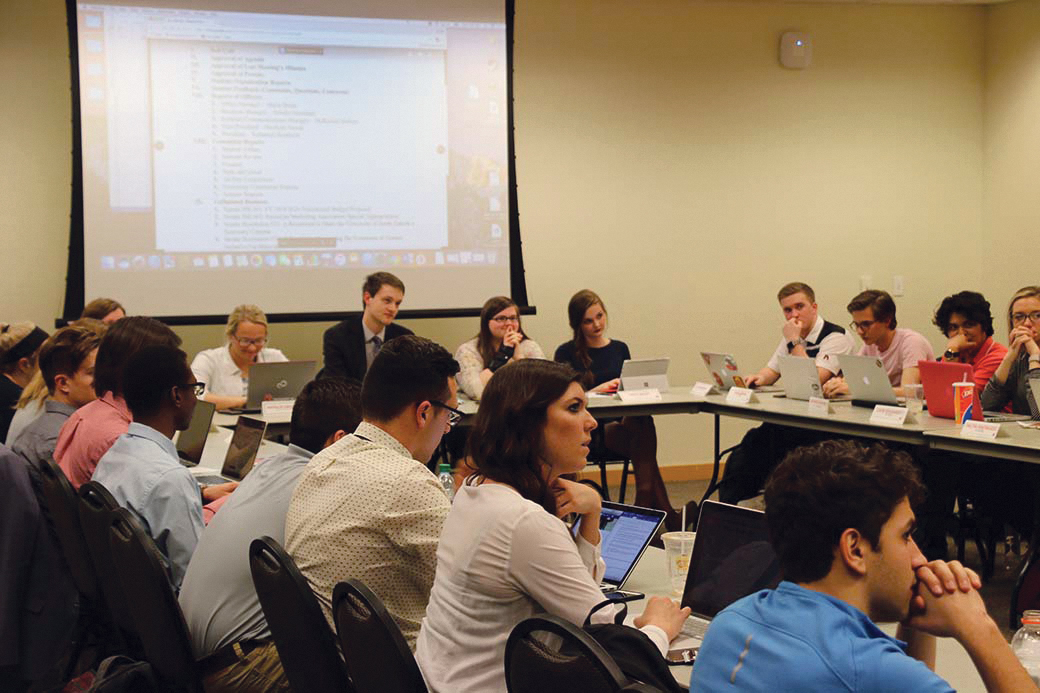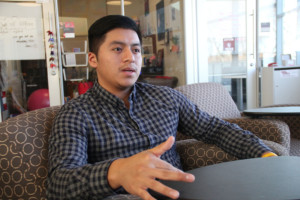
Students and faculty react to SGA sanctuary campus resolution
USD’s Student Government Association has recently been debating a resolution that, as it was originally written, supported making USD a ‘sanctuary campus,’ which wouldn’t cooperate with federal immigration enforcement officers in deportation proceedings.
The resolution, which is currently in the SGA state and local committee, has since had its sanctuary campus language removed, and currently is worded as a request for clarification on the university’s standing regarding immigration policies. While in committee, the bill could still be revised any number of ways, and the sanctuary campus wording could return.
SGA senator Josh Arens, the sponsor of the resolution, said he put a lot of thought into it.
“The vast majority of us, this does not effect. There is still a large number at USD that are international that are undocumented,” Arens said. “They will be affected by these policies either right now or in the future. I think it would be better to have the administration on top of this (and to) have a plan of action regardless of what President Trump does instead of being reactionary.”
President Trump’s recently-signed executive order closed U.S borders to Muslim countries such as Iran, Iraq, Syria, Sudan, Libya, Yemen and Somalia until a federal appeals panel rejected to reinstate President Trump’s travel ban.
Many USD students from affected countries, or countries neighboring the affected countries, have expressed their concerns about the travel ban, which has since been overturned by the courts.
Arens said making USD a sanctuary campus would show support to other students and their possible concerns with some of President Trump’s proposals.
“I have had people come up to me after Trump got elected with concerns,” Arens said. “This is kind of my way of voicing those concerns that I have heard because these things do not affect me.”
Cristobal Francisquez, president of USD’s Latino Student Organization (LASO), said there are flaws with the way Immigration and Customs Enforcement (ICE), the agency responsible for deportations, does its job.
Though the actions of ICE aren’t affecting Francisquez’s family now, he knows people living in fear of deportation.

“Growing up in the United States, my parents came here in the ’90s,” Francisquez said. “We live with fear. My mom got her citizenship and my dad is a resident, but I have friends who are living with this everyday.”
Francisquez said he supports the idea of making USD a sanctuary campus.
“I think the sanctuary campus is a great idea,” Francisquez said. “This is a school where people want to better themselves and stripping away education is probably the worst thing that could happen.”
USD isn’t the only campus to consider becoming a sanctuary campus. At the University of Alabama-Huntsville, students were inspired to make their campus into a sanctuary campus, and a change.org petition on the matter is now circulating.
Arens said the action taken by UAH students inspired him to draft this resolution.
Others in SGA aren’t as enthusiastic about the legislation. Senator Tim Flynn said the original bill went beyond SGA’s authority.
“In my opinion, it’s overstepping SGA’s bounds,” Flynn said. “I think our organization should be more, simply giving recommendations to the university, and with the current language in the bill, there’s a lot of words such as ‘demands’ in there.”
Even if the bill was approved by SGA, its actual intent might not be realized the way its supporters might hope, Flynn said.
“It wouldn’t make an immediate effect,” he said. “If SGA passes this bill, we’re not going to suddenly deny federal agencies physical access.”
Flynn also noted that the bill would have to rise up to the state level to actually have the force of law. And officials at the state level say they would be walking a fine line with this issue.
“There’s really no clear way to operationalize what that (sanctuary campus) means,” said Paul Turman, South Dakota Board of Regents vice president of academic affairs. “I think what we would seek to do is really lay out some sort of guideline or policy structure that establishes what being a ‘sanctuary’ meant for the campus.”
Turman said that refusing to cooperate with federal agencies could jeopardize federal funding for universities, making such a move potentially risky. So if ICE or another governmental entity requested permission to apprehend an undocumented student or community member, the university administration and the Board of Regents might have their hands tied.
Jordan Hanson, a junior political science major and a member of USD’s College Republicans, said she didn’t approve of the idea of a sanctuary campus.
“My issue is that SGA has gotten very progressive in their approach to different topics and I don’t think at this point that it’s necessary for them to do so,” Hanson said. “Unless they really (have) seen the need to become a sanctuary campus, I think that is an extreme route right now.”


